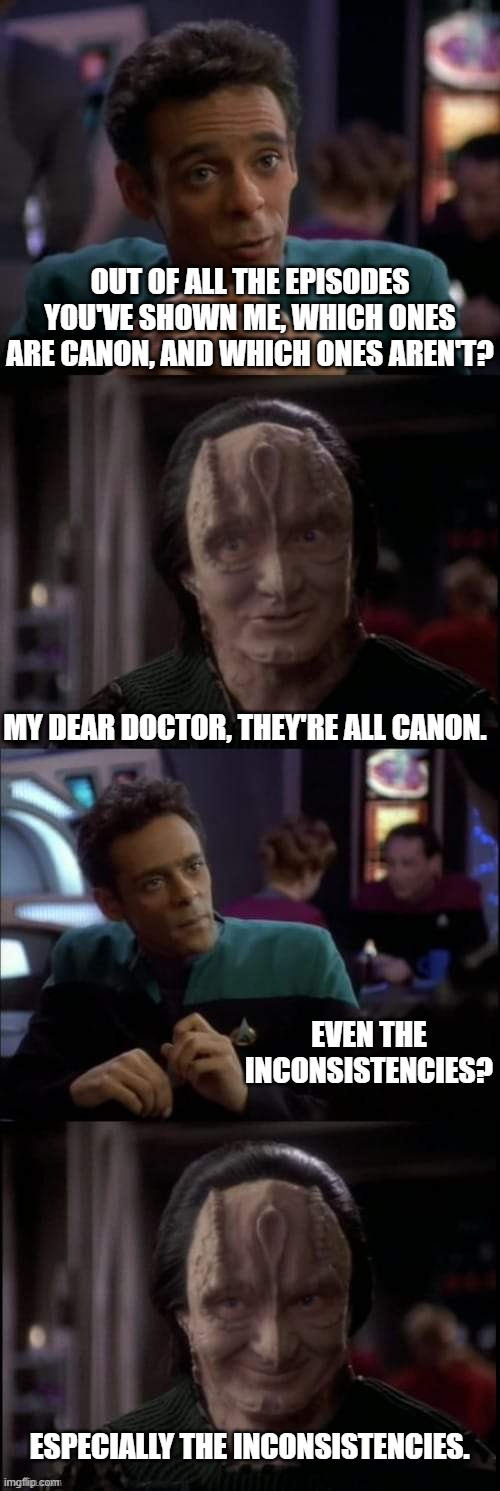Thank you. I am definitely a Star Trek fan who wants to see the franchise grow and evolve artistically rather than just primarily giving me the traditional formula.
&
I'm beginning to realize there is a great divide at the first principles level between pro-NuTrek and anti-NuTrek people. We discuss the franchise in different silos with little overlap. There is a fundamental difference of opinion over what "real Star Trek is".
For me, the whole drawing point to Star Trek is it:
- being an allegorical science fiction action adventure franchise set in a canonically interconnected shared universe
- based on the principles of secular humanism from 1960's new frontier modernist liberalism
- treating each era as a period piece, with verisimilitude and timelessness adding as much realism as possible
- the ships, the lore, the different species, the geopolitical situation reflecting 19th century Europe
- the "nautical but nice" way Starfleet is organized.
Star Trek from 1966-2005 fell under this formula more or less.
Sometimes
significantly less.
Deep Space Nine was on every level a deconstruction of that entire premise.
Discovery and
Picard are very much its creative descendants for being more skeptical in their approaches towards Roddenberrian Utopianism.
Yes, evolution from TOS to ENT, but no dramatic ruptures.
I think
Deep Space Nine was a
very significant rupture.
And moving too far away from this formula raises questions, especially to the Tech Manual / Chronology / Encyclopedia crowd for whom for almost two decades everything new was at least supposed to fit together in canon (Yes, yes, I know, it's not perfect... but 99% is damn near perfect all things considered).
I mean, people used to say the same thing about
Enterprise. There are always plot devices to rationalize apparent discontinuities. Plus, y'know, maybe at the
sixty-year mark we need to start giving suspension of disbelief a bigger role.
Based on Sci's analysis, I'd argue there's a four quadrant model of Star Trek at present, revolving around canonicity (being informed and bound by what came in the past) and revisionism (different approaches well outside the 1966-2005 guardrails).
PICARD seasons 1 and 2 are canonical, but revisionist. DISCOVERY and SNW are both uncanonical and revisionist. While LOWER DECKS and PRODIGY are canonical, but somewhat revisionist in format. Next you have something like THE ORVILLE, which is uncanonical but non-revisionist to Star Trek.
PICARD season 3 could be the first canonical, non-revisionist season of Star Trek produced since ENT season 4.
I think there's something to your analysis here, but I would suggest that your terminology should be revised. Instead of
canonocity, I would suggest a binary of
tighter continuity/looser continuity; instead of
revisionism, I would suggest
traditional paradigm/experimental paradigm.
Under this schema, I think
Deep Space Nine would be in the
tighter continuity/experimental paradigm quadrant.
Next Generation and
Voyager would be in the
tighter continuity/traditional paradigm quadrant, while
Enterprise would be in the
looser continuity/traditional paradigm quadrant, and TOS would be in the
looser continuity/experimental paradigm quadrant. (I would put TOS in the
experimental paradigm side of the binary because, well, TOS experimented with its episode genres a lot more than
Next Generation, Voyager, or
Enterprise did.)



